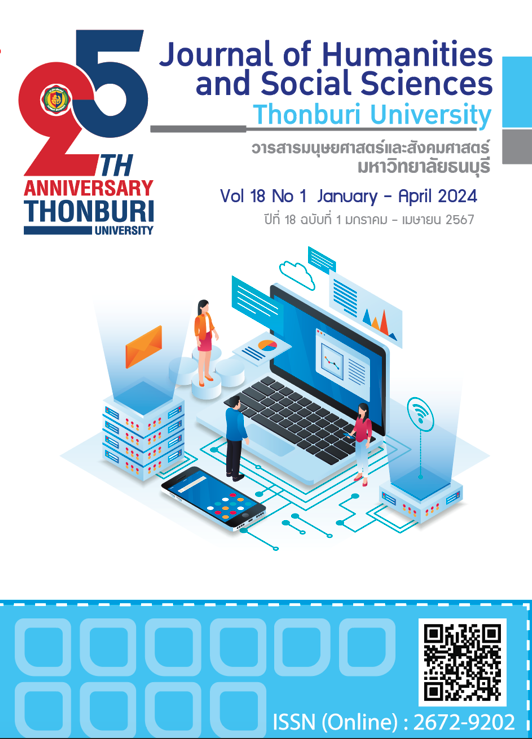Participatory Communication through “Hukum Pakat”: A Case Study of Ban Bannangluwa Community-Based Tourism Management in Yala Province
Keywords:
Participatory Communication, Hukum Pakat, Community-Based Tourism Management, Ban BannangluwaAbstract
Participatory communication is essential to community-based tourism management. This is because communication is the mechanism that drives community development through participation process of community members. The research aims to analyze the role of communication in community tourism management and the strategy of participatory communication in the case of Ban Bannangluwa, Yala province. The data collection tools include (1) documentary research, (2) non-participant observation of researchers, and (3) in-depth interviews with two groups of people using semi-structured interviews, namely a group of four government officials at the Yala Provincial Tourism and Sports Office, and a group of people in the Bannangluwa community-based tourism. They are (1) five representatives of the Bannangluwa community tourism enterprise committees, (2) two youths working for the Bannangluwa community-based tourism, and (3) two villagers who sell food and drinks in the tourism area, a total of 13 informants. The research findings indicate that personal media through an opinion leader, who wins people’s trust, employs interpersonal communication and face-to-face conversations to create community participation, using “Hukum Pakat” as communication strategy. The Hukum Pakat collectively determined by the community to create sustainable income-generating activities and distribute profits within the community. Through Hukum Pakat, the community can be self-reliant while taking care of nature and environment to be in existence.
References
กฤษฎา สุริยวงค์, สุวันชัย หวนนากลาง และฐิตินัน บุญภาพ คอมมอน. (2564). การสื่อสารเพื่อการพัฒนาการท่องเที่ยวเชิงสร้างสรรค์โดยชุมชนมีส่วนร่วมของจังหวัดเพชรบุรี. วารสารมนุษยสังคมปริทัศน์. 23(1): 43-57.
กองเศรษฐกิจการท่องเที่ยวและกีฬา สำนักงานปลัดกระทรวงการท่องเที่ยวและกีฬา. (2562). สรุปขีดความสามารถในการแข่งขันด้านการท่องเที่ยวของไทย ปี พ.ศ.2562. สืบค้นเมื่อ 8 กันยายน 2566, จาก https://www.mots.go. th/download/article/article_20190925130927.pdf
จินตวีร์ เกษมศุข. (2561). แนวคิดการมีส่วนร่วมของประชาชนเพื่อการพัฒนาชุมชนที่ยั่งยืน. วารสารวิชาการมนุษยศาสตร์และสังคมศาสตร์. 26(50): 169-186.
ทิพย์สุดา ปานเกษม. (2559). การสื่อสารแบบมีส่วนร่วมเพื่อส่งเสริมการท่องเที่ยวเชิงสร้างสรรค์ในจังหวัดน่าน. ศิลปศาสตร มหาบัณฑิต, สถาบันบัณฑิตพัฒนบริหารศาสตร์.
นรินทร์ สังข์รักษา และคณะ. (2553). ถอดบทเรียนกระบวนการเรียนรู้เศรษฐกิจพอเพียงแบบก้าวหน้าของวิสาหกิจชุมชนเพื่อการอยู่เย็นเป็นสุขในจังหวัดราชบุรี. นครปฐม: คณะศึกษาศาสตร์ มหาวิทยาลัยศิลปากร.
บุญช่วย ค้ายาดี. (18 มิถุนายน 2564). การท่องเที่ยวชุมชนอย่างยั่งยืน. ไทยโพสต์ออนไลน์. สืบค้นเมื่อ 8 กันยายน 2566, จาก https://www.thaipost.net/main/detail/106734
ประไพพิมพ์ สุธีวสินนนท์ และประสพชัย พสุนนท์. (2559). กลยุทธ์การเลือกตัวอย่างสำหรับการวิจัยเชิงคุณภาพ. วารสารปาริชาต มหาวิทยาลัยทักษิณ. 29(2): 31-48.
ปรีดา นัคเร, ลดาวัลย์ แก้วสีนวล และเพียงพิศ ศรีประเสริฐ. (2566). กลยุทธ์การสื่อสารเพื่อการท่องเที่ยวโดยชุมชน: กรณีศึกษาบ้านนาแงะ ตำบลนาเหรง อำเภอนบพิตำ จังหวัดนครศรีธรรมราช. วารสารนาคบุตรปริทรรศน์. 5(1): 2-12.
เพชรา บุดสีทา. (2552). การจัดการด้านการตลาดการท่องเที่ยวชุมชนนครชุม จังหวัดกำแพงเพชร. กำแพงเพชร: มหาวิทยาลัยราชภัฏกำแพงเพชร.
เมษ์ธาวิน พลโยธี, สุธาธิณี หนูเนียม และสุวิชาดา สกุลวานิชเจริญ. (2565). แนวทางการพัฒนาการท่องเที่ยวโดยชุมชนอย่างยั่งยืน กรณีศึกษา ชุมชนไทดำ บ้านนาป่าหนาด อำเภอเชียงคาน จังหวัดเลย. วารสารวิชาการการท่องเที่ยวไทยนานาชาติ. 18(1): 1-25.
รายงานสถานการณ์ชายแดนใต้. (2564). เที่ยววันหยุดชมวิวเชิงเขาหน้าถ้ำ ชุมชนท่องเที่ยวบ้านบันนังลูวา สร้างงาน สร้างอาชีพ ให้ชุมชน. สืบค้นเมื่อ 3 ธันวาคม 2566, จาก https://www.southernreports.org/2021/12/26/fgrtf1425/
สมพร เกื้อไข่, วิทยาธร ท่อแก้ว และธิติพันธ์ เอี่ยมนิรันดร. (2565). การสื่อสารเพื่อการจัดการท่องเที่ยวโดยชุมชนตะโหมด จังหวัดพัทลุง. วารสารเทคโนโลยีภาคใต้. 15(2): 1-11.
สุดถนอม ตันเจริญ. (2561). การจัดการการท่องเที่ยวโดยชุมชนกับการพัฒนาการท่องเที่ยวอย่างยั่งยืนของชุมชนบางขันแตก จังหวัดสมุทรสงคราม. วารสารวิชาการมหาวิทยาลัยราชภัฏเพชรบุรี. 8(2): 32-41.
สุดารัตน์ แสงแก้ว, ปิยวรรณ สิริประเสริฐศิลป์ และปรีดา ศรีนฤวรรณ. (2561). คุณลักษณะและความชัดเจนของผู้มีอิทธิพลทางการตลาด : กลุ่มผู้นำทางความคิด. จุฬาลงกรณ์ธุรกิจปริทัศน์. 40(157): 1-24.
สุภางค์ จันทวานิช. (2553). วิธีการวิจัยเชิงคุณภาพ. พิมพ์ครั้งที่ 17. กรุงเทพฯ: สำนักพิมพ์แห่งจุฬาลงกรณ์มหาวิทยาลัย.
อนุชา สุขแสง และวรรษิดา บุญญาณเมธาพร. (2566). ปัจจัยที่ส่งผลต่อการตัดสินใจท่องเที่ยวผ่านแพลตฟอร์มยูทูบ. วารสารวิชาการการท่องเที่ยวไทยนานาชาติ. 19(1): 74-100.
อภิญญา เฟื่องฟูสกุล. (2546). อัตลักษณ์. กรุงเทพฯ: สำนักงานคณะกรรมการวิจัยแห่งชาติ.
Gilbert, D., & Abdullah, J. (2002). A study of the impact of the expectation of a holiday on an individual’s sense of well-being. Journal of Vacation Marketing. 8(4): 352-361.
Goldsmith, R. E., & Clark, R. A. (2008). An analysis of factors affecting fashion opinion leadership and fashion opinion seeking. Journal of Fashion Marketing and Management: An International Journal. 12(3): 308-322.
Muyanga, C., & Phiri, J. (2021). Assessment of effective communication in international schools in developing countries based on the Berlo’s SMCR model. Open Journal of Business and Management. 9(1): 448-459.
Yan, L. (2014). Social capital characteristics of open source software opinion leaders. Journal of Computer Information Systems. 54(4): 1-10.
Translated Thai References
Budseeta, P. (2012). Community-based marketing management on tourism of Ban Nakornchum Kamphaengphet province. Kamphaengphet: Kamphaengphet Rajabhat University. (in Thai)
Chantavanich, S. (2010). Qualitative research methods. 17thed. Bangkok: Chulalongkorn University Press. (in Thai)
Economics Tourism and Sports Division, Office of the Permanent Secretary. (2019). Summary of Thailand's tourism competitiveness in 2019. Retrieved 8 September 2023, from https://www.mots.go.th/download/article/article_20190925130927.pdf (in Thai)
Feungfusakul, A. (2003). Identity. Bangkok: National Research Council of Thailand. (in Thai)
Kasemsuk, C. (2018). Public participation approach for sustainable community development. Academic Journal of Humanities and Social Sciences. 26(50): 169-186. (in Thai)
Kayadee, B. (18 June 2021). Sustainable community-based tourism. Thai Post. Retrieved 8 September 2023, from https://www.thaipost.net/main/detail/106734 (in Thai)
Kuakhai, S., Tokaew, W., & Iamnirun, T. (2022). Communication for community-based tourism management in Tamot, Phatthalung province. Journal of Southern Technology. 15(2): 1-11. (in Thai)
Nakary, P., Kaewseenual, L., & Sriprasert, P. (2023). Communication strategies for community-based tourism: A case study of Nangae, Nareng, Nopphitam in Nakhon Si Thammarat. Narkbhutparitat Journal. 5(1): 2-12. (in Thai)
Parnkasem, T. (2016). Participatory communication for the promotion of creative tourism in Nan province. (Master of Arts Thesis, National Institute of Development Administration). (in Thai)
Polnyotee, M., Nuniam, S., & Sakulwanichcharoen, S. (2022). Sustainable community-based tourism development guideline: A case study of Tai Dam community at Ban Na Pa Nard, Chiang Khan district, Loei province. Journal of International and Thai Tourism. 18(1): 1-25. (in Thai)
Saengkeaw, S., Siriprasertsil, P., & Srinaruewan, P. (2018). The attributes and clarity of influencers in marketing: Case of opinion leaders. Chulalongkorn Business Review. 40(157): 1-24. (in Thai)
Southernreports.org. (2021). Holiday travel to see mountainside cave view, Ban Bannangluwa community-based tourism, job creation for the community. Retrieved 3 December 2023, from https://www.southernreports.org/2021/12/26/fgrtf1425/ (in Thai)
Suksang, A., & Boonyanmethaporn, W. (2023). Factors affecting travel decisions through the YouTube platform. Journal of International and Thai Tourism. 19(1): 74-100. (in Thai)
Sungrugsa, N. et al. (2013). A lesson learnt from progressive sufficiency economic activities on integrated learning processes of community enterprises for green and happiness society in Ratchaburi province. Nakhon Pathom: Faculty of Education, Silpakorn University. (in Thai)
Suriyawon, K., Hounnaklang, S., & Boonpap Common, T. (2021). Communication for creative tourism development through community participation in Phetchaburi province. Journal of Humanities and Social Sciences Review. 23(1): 43-57. (in Thai)
Sutheewasinnon, P., & Pasunon, P. (1996). Sampling strategies for qualitative research. Parichart Journal. 29(2): 31-48. (in Thai)
Tancharoen, S. (2018). Community-based tourism management and sustainable tourism development of Bangkantaek community in Samutsongkhram province. Academic Journal of Phetchaburi Rajabhat University. 8(2): 32-41. (in Thai)
Downloads
Published
How to Cite
Issue
Section
License
Copyright (c) 2023 Hamdia Mudor

This work is licensed under a Creative Commons Attribution-NonCommercial-NoDerivatives 4.0 International License.
ผลงานที่ปรากฎในวารสารฉบับนี้เป็นลิขสิทธิ์เฉพาะส่วนบุคคลของผู้เขียนซึ่งต้องรับผิดชอบต่อผลทาง กฎหมายที่อาจเกิดขึ้นได้และไม่มีผลต่อกองบรรณาธิการ






